- Investors to continue rotating out of growth into defensive, dividend players.
- Short-term uptrend held after price confirmed long-term downtrend.
- Energy to fall, as recession outweighs war.
- How to determine whether my S&P 500 prediction is correct
- Any company’s financials for the last 10 years
- Financial health scores for profitability, growth, and more
- A fair value calculated from dozens of financial models
- Quick comparison to the company’s peers
- Fundamental and performance charts
This week could prove to be a technical catalyst between the short-term and the long-term trends as global central banks are slated to increase interest rates amid persistently high |inflation.
With September historically the second-worst month of the year, investors are likely to resume a rotation from growth to defensives, energy, and dividend stocks.
Energy was the only S&P 500 Index sector in the green, rising 1.83% on Friday.
Utilities was the clear relative winner for the week, retreating only 1.47%. Healthcare followed with a 1.81% decline. On the other end of the spectrum, technology plunged by over 5%.
On a monthly scale, only energy and utilities were up, 4.36% and 0.97%, respectively. Technology lost 7% during that time.
Utilities outperformed in the past three months, losing just 0.15%. Communication services lost 11.65%. However, materials underperformed with a 15.05% plummet as economic growth slowed.
Also, on a six-month basis, only energy and utilities were green, roughly 9.5%. Underperforming, once again, was communication services - down 21.02% - and technology, which slumped 13.88%.
Again, the same sectors were the only two S&P 500 sectors that were positive for the year, with energy catapulting 44.07% and utilities gaining 4.22%.
Finally, on a 12-month basis, energy surged 63.52%. Utilities climbed 6.46%, putting the same two industries alone in green territory. Conversely, communication services was gutted with a 30.7% loss, followed by technology's 23.6% drop. At the same time, communication services lost 37% and technology 16.3%, coming in as the two worst performers.
Energy has been outperforming only due to the Russia-Ukraine war. However, the sector closed on Friday less than 0.5% from its lowest level since Jan. 27, on prospects of a slowdown. I have given a repeated bearish call. In this post WTI was trading above $95. According to my analysis, oil is en route to keep falling below $60.
So, energy's outperformance thus far does not represent economic health, in my opinion. Instead, its continued decline does. Conversely, the rotation into defensive and dividend payers out of growth stocks is a vote of no confidence in economic growth.
We get confirmation from the global bond market, which fell into a bear market last week for the first time in a generation. Bonds suffered their "worst year in history" due to an extreme transition from the lost decade of little to no inflation to the highest in four decades.
I have been bearish throughout this entire rally since the mid-June bottom. I wrote a few weekly posts in which I said that I don't know whether stocks will necessarily fall this week, but that I expected them to. When they finally did top out Aug. 16, having lost nearly 10% since then, some readers commented that, of course, at some point markets will fall. They said I was a "permabear," irrationally pessimistic. As far as they're concerned, if stocks didn't fall on the day or week I said I expected them to, I was wrong.
But assets don't move in straight lines. When I make a call, I am not saying that the asset will go in my direction from that moment. I clarify that the asset may move the other way first. So, how to know if my call is successful or not? There must be a gauge. Those are peaks and troughs.
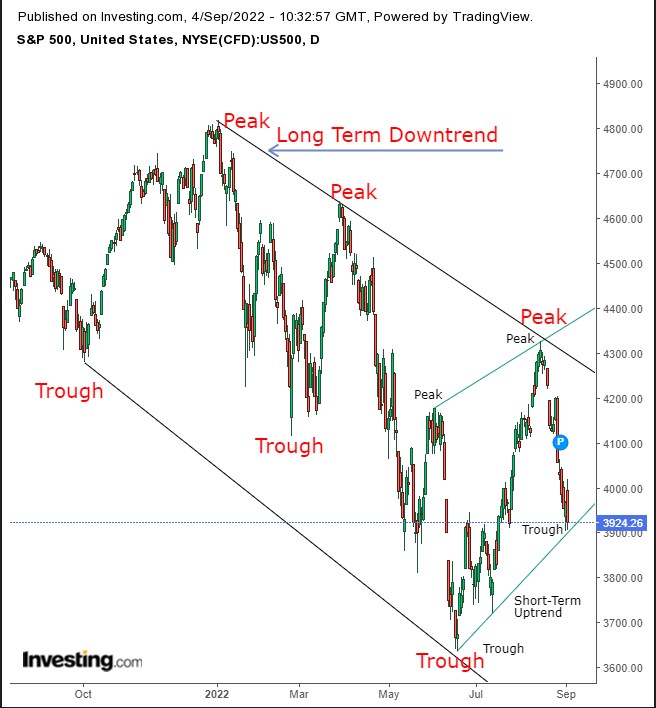
Source: Investing.com
Here you can see the short-term uptrend versus the long-term downtrend. My call is intact if the short term doesn't reverse the long term with higher peaks and troughs. However, for me to be correct, the price has to register a new low below June's bottom. Until then, I will not claim that my bearish call was right just because it fell. Note how the S&P 500 found support precisely at the short-term rising channel. That means it's still in play. While a lower price will technically (in English, not technical analysis) prove me right, I will consider my call a failure. I will take pride in my estimation if the price creates a leg lower, proportionate to the previous troughs.
The price fell about 700 points, or 14.6%, between the Jan. 4 record peak and the Feb 23 low. Then, it fell another 1,000 points or 21.6% between the March 28 peak and the June 17 low. That's the kind of decline I'm looking for. The price has so far dropped 419 points, or 9.7%, from its Aug. 16 high. If it at least registers a new low, it will fall at least 688 points or almost 16%. On Aug. 25, I forecast that the S&P 500 would fall toward 3,000. If it reaches that area, I will consider my call successful.
Meanwhile, the major averages fell for three straight weeks for the first time since the bottom. The Nasdaq, representing growth stocks, fell for six days in a row.
America created 315,000 jobs in August, threatening further inflation and egging on the Federal Reserve with more aggressive tightening, which is the theme that has been causing stocks to fall and bond yields to rise. Conversely, unemployment rose to 3.7% from 3.5%. It's the highest rate since 2020, tying with the lowest since 1969. However, unemployment didn't rise because more people lost their jobs but because they started looking for work again. Employers have been starving for a labor force, and this added supply benefits the economy. However, if the new jobs won't help the economy grow, it will be another sign of an economic downturn.
The U.S. dollar initially dropped on Friday because the Fed would have options and not be forced to keep raising rates as quickly. Average hourly wages began to fall, a sign of easing inflation. However, the dollar bounced and closed at the highest level in 20 years, since June 19, 2002. The dollar hit my target and then some, and I expect it to go higher yet.
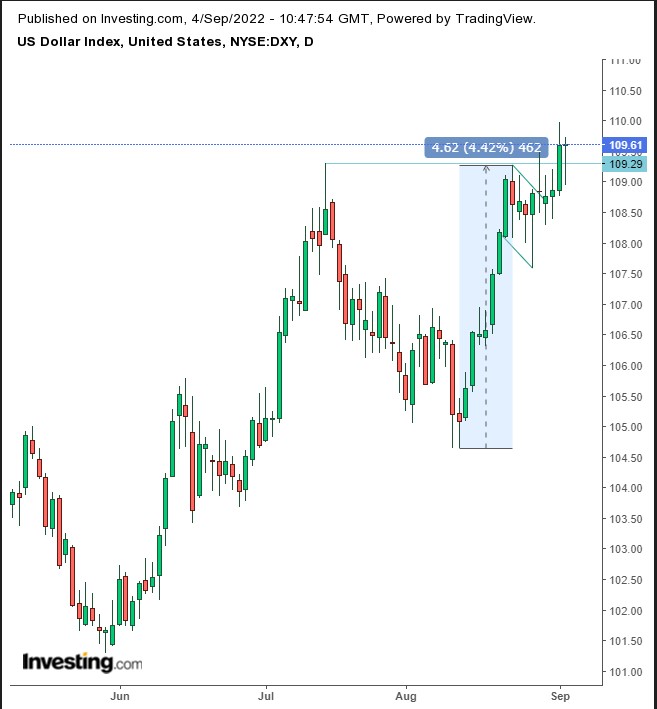
Source: Investing.com
The dollar completed a falling flag, with the implied target of 4.62 from the 108.70 breakouts to about 112.03.
Gold jumped on Friday upon the August jobs report, despite the dollar's perseverance.
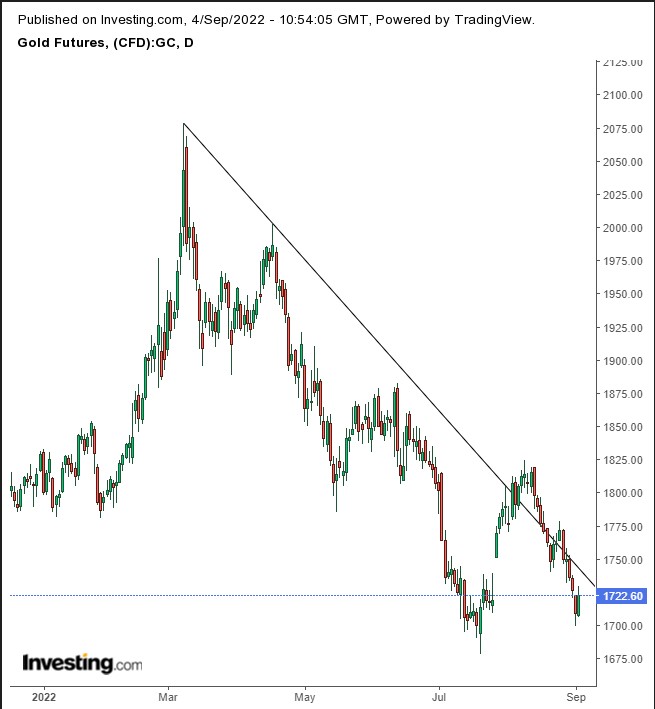
Source: Investing.com
Gold opened lower but erased Thursday's losses, forming a bullish piercing pattern that is almost an engulfing pattern.
The two-day favorable reversal structure developed above the July lows, giving it more strength. The $1,700 price area has been longstanding support since April 2020. Nevertheless, the commodity is still in a downtrend since the March 8 peak.
Bitcoin dropped for the third straight day, the fourth week in a row, and the second month. On Friday, excited traders bid up BTC above $20,000 after the employment data, but they couldn't maintain gains.
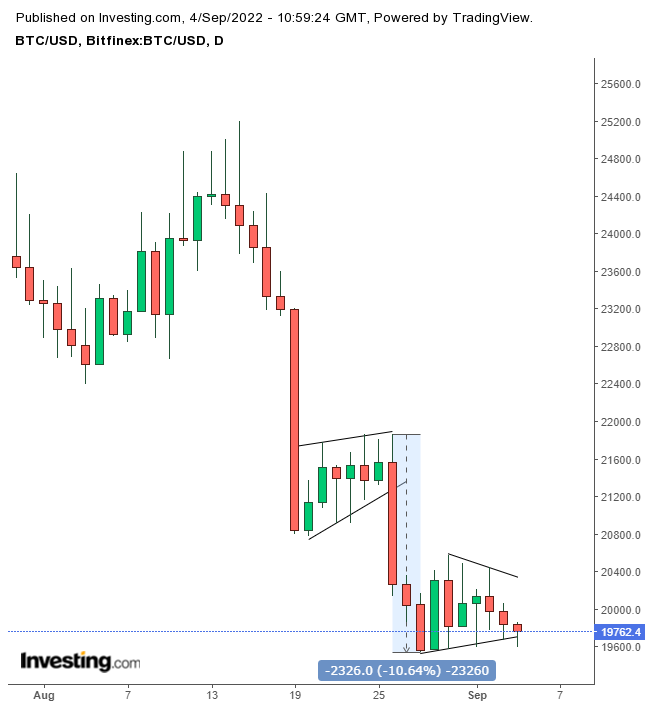
Source: Investing.com
The digital currency leader trades within a pennant in the second consecutive continuation pattern. When the pennant completes, with a downside breakout, it will imply a $17,392 target within my overall, long-term bearish call.
Oil may have completed a rising flag, implying an $81.50 target. Note that Friday's trading developed an inverted hammer. A close above Friday's opening price will suggest a return move to retest the flag's integrity before heading lower.
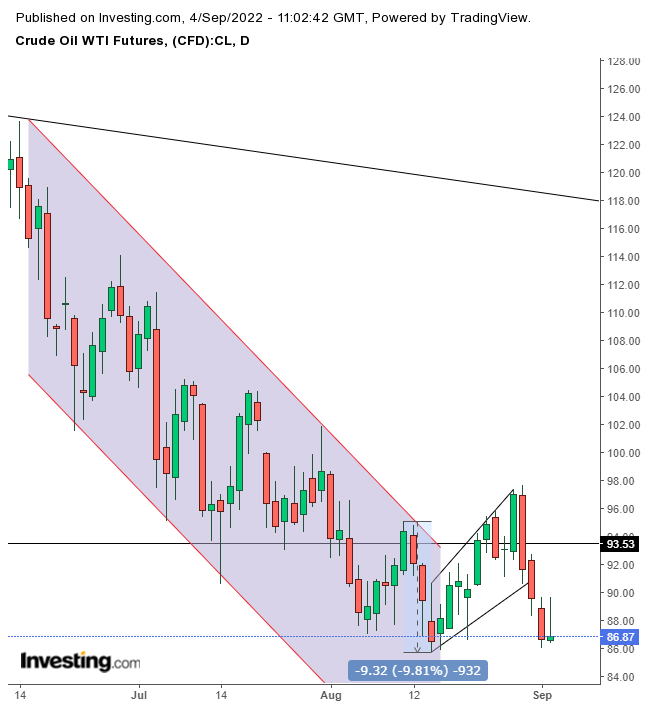
Source: Investing.com
Disclaimer: The author currently does not own any of the securities mentioned in this article.
***
Looking to get up to speed on your next idea? With InvestingPro+ you can find
And a lot more. Get all the key data fast so you can make an informed decision, with InvestingPro+. Learn More »
